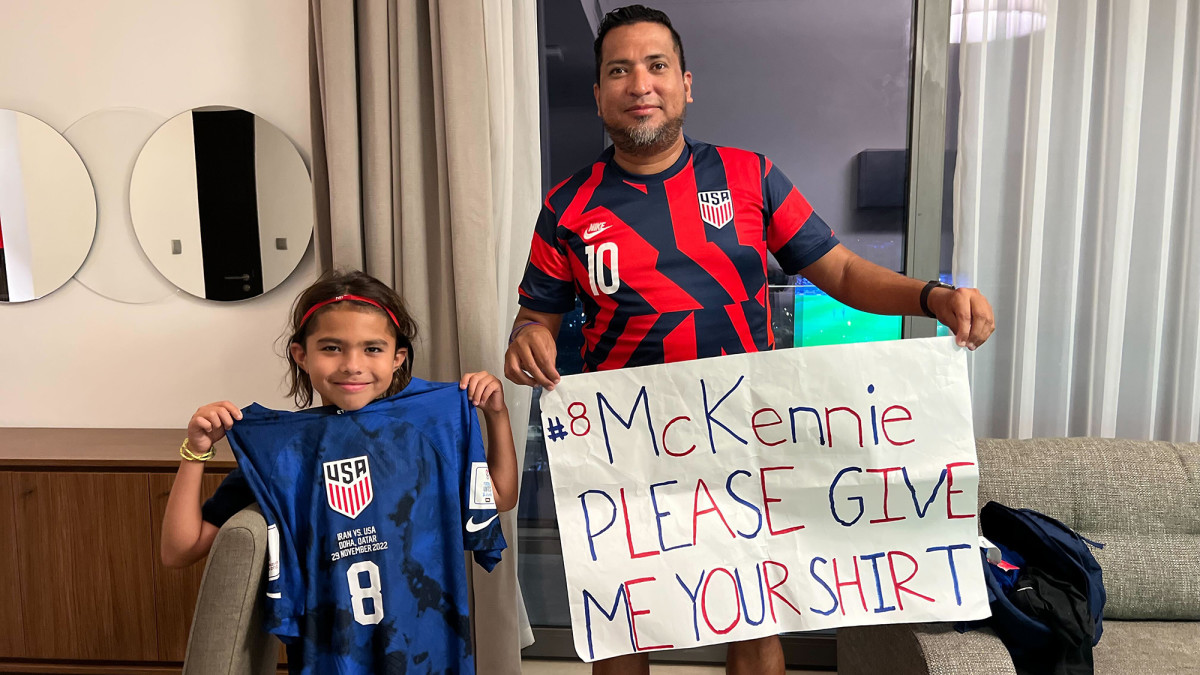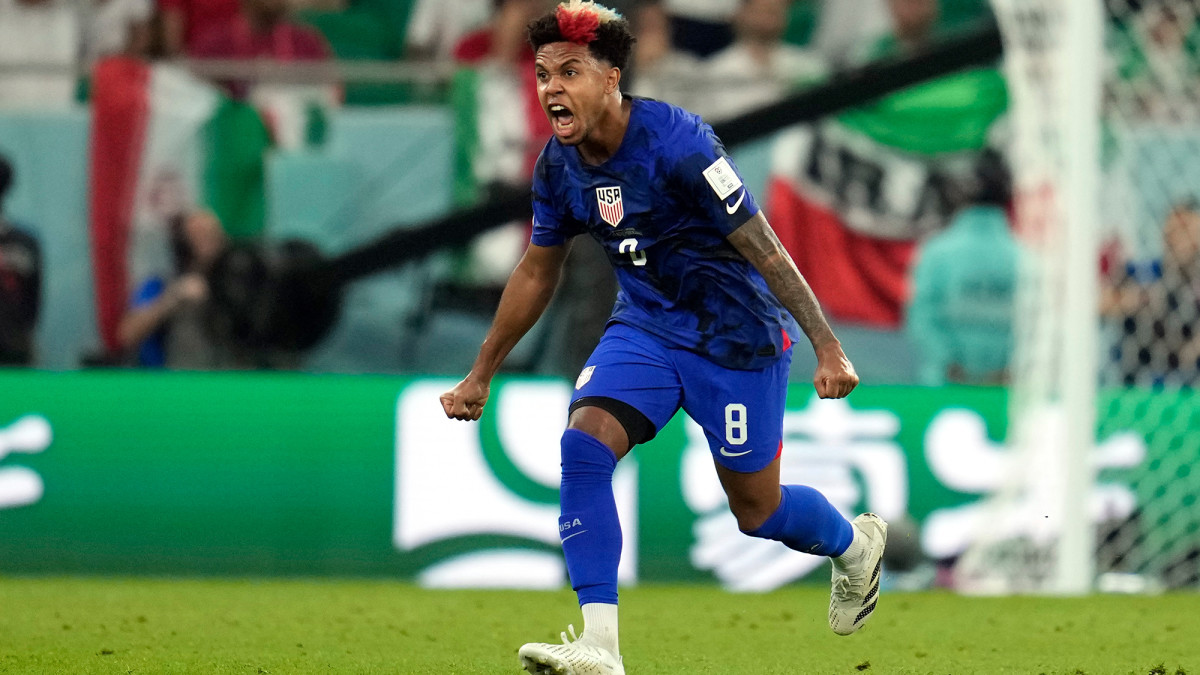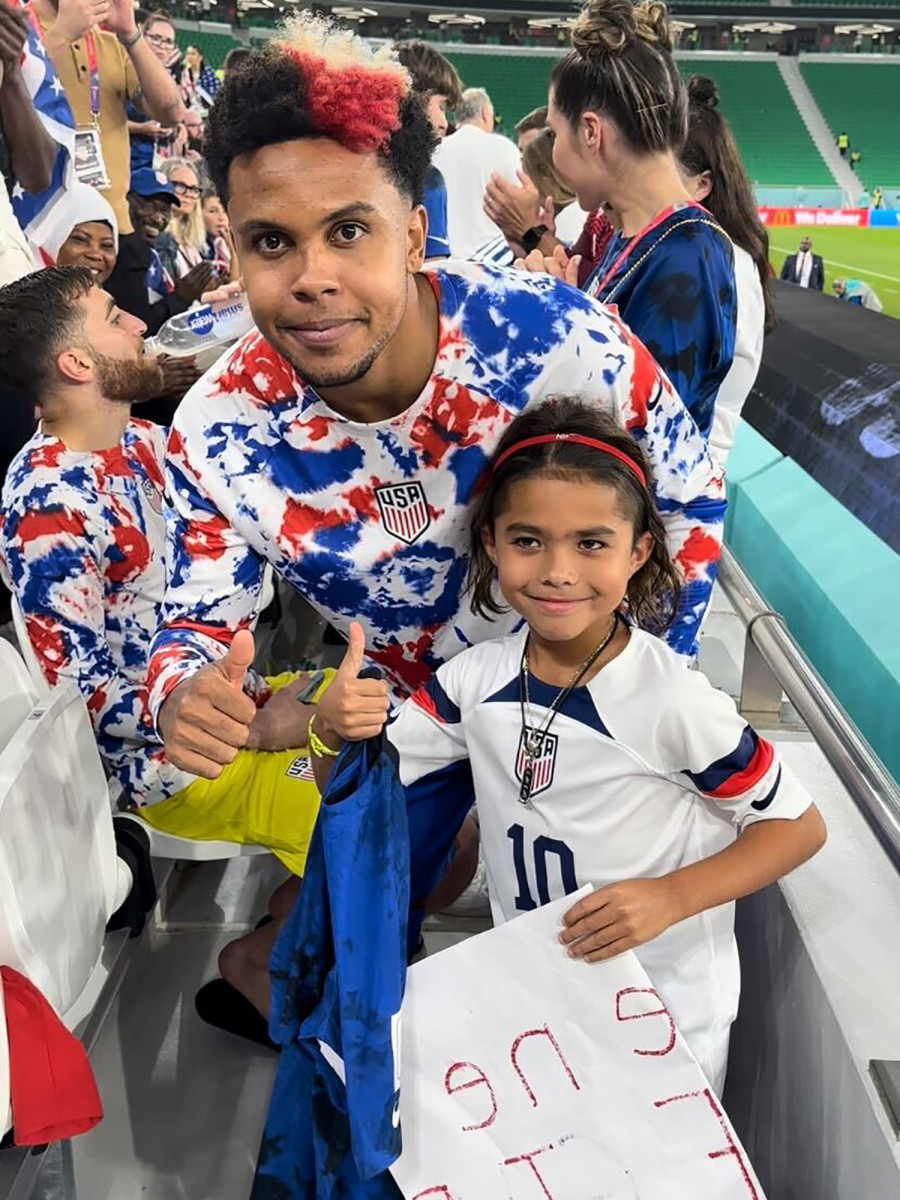Weston McKennie Makes One Young Fan’s Night to Bring His USMNT Experience Full Circle
DOHA, Qatar — Luka Lizardo couldn’t wait. It was Tuesday afternoon, only a few hours before the United States would play Iran for a spot in the World Cup’s knockout stage, and he had fallen squarely into are-we-there-yet mode. So he did what he always does. He dribbled a soccer ball, spinning and twirling and whirling, like a puppeteer who needed only feet.
When Luka grew bored of the usual routine, he made a prediction to his father, Axel. The U.S. would win, 1–0, the 8-year-old said, and Christian Pulisic would score the lone goal. His dad laughed. Luka wondered why.
And then, with little else to do as time dragged before kickoff, Luka decided to make a sign. First, he considered writing something to Pulisic. Then he reconsidered. Why? “Because I wanted to,” he says on Wednesday, sitting at a kitchen table in a hotel high above downtown. He kept an eye on the nearest television and the other on an unopened duffle bag nearby.
The white sign was folded and tucked into the bag, with every symbol, letter and number scribbled in marker, alternating between red and blue. It read:
#8 McKennie
PLEASE GIVE
ME YOUR SHIRT
Luka saw neither the prediction nor the sign as child’s play. This wasn’t a fantasy to him. This was what he wanted. Weston McKennie was one of his favorite players. Luka liked how McKennie dyed colorful streaks in his hair. He liked how the midfielder zoomed around the field. He knew him from Juventus, from an all-access documentary series he watched with his family and, of course, as a key member of the USMNT. He figured they would be teammates—and not “one day,” but in 10 years, when he turns 18 and McKennie will be 34. In the meantime, he planned to dye red, white and blue streaks in his hair, like McKennie in Qatar.
When he completed the sign, with the help of his father’s friend and a fellow U.S. supporter, what did he think was realistic? “I wanted him to give me his shirt,” Luka says.
O.K., then. It was time to go. Axel and Luka couldn’t get the right directions and missed the supporters’ rally for American fans. But as they traversed the streets near Al Thumama Stadium, Luka beamed. Wasn’t he the luckiest 8-year-old alive?
His father had surprised him with this World Cup trip: 10 days in the Middle East, a side-jaunt to Egypt to see the pyramids, tickets to all three U.S. matches in Group B and a bevy of other games to attend, in order to study, up close, the best players in the world. This is exactly the group that Luka plans to join. They flew to London from their home in Tampa, then connected to Qatar. Luka met American soccer obsessives from all over. He saw fans fighting in the ticket lines at Argentina-Mexico, and that scared him. With an apparent grasp of sporting rivalries, he told his father, “I wish they weren’t in the same group.”
As the Lizardos walk into the stadium, though, Luka holds no doubts.
“I knew we were going to win,” he says, eyeing the TV and the duffle bag.

Luka loved McKennie. But he is 8, after all, and there were many things he didn’t know. He didn’t know that the McKennie family moved from Texas to Germany when Weston was only 6, not far from Luka’s age now. Or that Weston’s father, John, served in the Air Force, hence the move. Or that Weston scored so many goals against his age group that officials in his league continued to move him up to compete against older players. Just like Luka would.
He also didn’t know that the USMNT visited Germany in 2006, for a friendly against Poland. Or that they swung by Ramstein Air Base, where John was stationed, to meet with military families. Or that Weston’s parents helped him find soccer stars in Landon Donovan and Carlos Bocanegra. Or that Weston took pictures with them, marking one of the best days of his life.
Never know who's got next.
— U.S. Soccer Men's National Team (@USMNT) November 10, 2017
In 2006 in 🇩🇪, 7-year-old @WMckennie met two of his #USMNT idols.
The story » https://t.co/Se6T2a34kR pic.twitter.com/uo89ADJ3P1
The remarkable rise that took place after—FC Dallas youth academy, Schalke, Juventus, national team—was at least impacted by those players on that day. In the photo, Weston sat between the U.S. players, wearing a gray hoodie and clutching a gold soccer ball.
Fast forward to earlier this month. Now, McKennie is becoming them. He’s 24, oozes confidence and arrives in Qatar with those streaks in his hair, a nod to his country and his father’s service. He embodies a young team with vast promise that seems to be building toward much more. Proof, along with poetic symmetry, was obvious when McKennie and his teammates visited Al Udeid Air Base. McKennie thanked the same type of crowd he once stood in, then promised to represent them “the best way we can.”
In the USMNT’s first two matches, McKennie was everywhere, deploying a typically enigmatic blend of dazzle and danger. Despite injury concerns that lingered all the way up to the opener, he started against Wales, boosting the U.S. but earning an early yellow card. Against mighty England, he created scoring chances from the right wing, displaying uncommon athleticism while setting up wider than usual, near the right sideline. But he biffed an unmarked scoring chance and drew either laughter or (overblown) criticism for using a photographer’s vest to wipe the sweat from his hands.
The luckiest 8-year-old in the world watched all this and saw McKennie, the player he admired, sometimes dubious, athletic beyond belief and singular, distinct.
McKennie deserved the sign, Luka thought.

Luka has a soccer soul. His Instagram page is proof. There’s Luka watching soccer. There’s Luka playing soccer. There’s Luka training to play soccer. There’s Luka’s soccer cleats, with green tape affixed to the heels and MAMBA and MENTALITY written in black ink. If that’s not enough to prove the boy’s obsession, his TikTok handle (lukalovessoccer) is confirmation.
Axel hails from Honduras, a country that’s so obsessed with the beautiful game that he laughs at a question about when he became interested in it. Maybe birth. He shrugs. Maybe before birth. He tried to give his son options, taking Luka to karate classes and swim lessons. But soccer called to the boy, too.
There’s no way to marry Luka’s current ability to a firm prediction that he’ll reach his lofty goals. But Luka is fast, technically sound and keeps destroying age groups only to move up to the next one. He’s playing U-11 now, but Axel says coaches want him to play U-12 or U-13.
Luka can score, too, bending corner kicks into goals and even running into goalkeepers while knocking the ball in. He traveled to Honduras for training with two of the country’s best youth clubs. He partakes in private classes every morning. Next spring, he will play for a U.S. team in a tournament in Barcelona. But what does he love about soccer, more than anything? “It’s fun,” Luka says, “and scoring.”
“I just love to play.”
Luka’s baby sister just turned 1. She’s not old enough for soccer yet, but Luka says that whenever she sees a ball—tennis, soccer, volley, basket—she grabs it. Maybe she’ll become a keeper, like their dad. Axel’s grandfather was a soccer coach. His nephew plays in Spain’s second division. The sport is a family affair, if that wasn’t obvious by the 10-day World Cup trip.
Besides soccer, Luka spends time with friends and family. But he doesn’t take much of a break. His goofing around with relatives is often spent outside, soccer balls pinging off Lizardo feet. His time with friends is devoted to FIFA, the video game, and he only plays with the same two teams, the ones he wants to play for: the USMNT and Real Madrid.
“I never lose,” he says.
He’s not thinking about all that at Al Thumama Stadium, as the U.S. team he admires is moving the ball and taking shots on Iran. The midfield, led by McKennie, Tyler Adams and Yunus Musah, is key to the Americans’ attack. They’re living up to their MMA nickname, all style and guile, like an MMA legend climbing inside a cage.
Watch the World Cup with fuboTV. Start your free trial today.
Suddenly, there it is. Luka watches the sequence unfold and recognizes, instantly, what’s happening. McKennie launches the ball to Sergiño Dest on the right wing. The pass is perfect, and Dest sails it across the goal, toward—who else?—Pulisic. Right then, just as young Luka had predicted, Pulisic scores, but not before first colliding with Iran’s goalkeeper, catching the worst of it "below the abdomen.”
Luka was right. About the goal. About the player who would score it. About the final score. And about this group, young and swaggy and joyful, as embodied by their distinct midfielder.
McKennie deserved the sign, yes. But now the boy who is also young and swaggy and joyful thinks something else.
He deserves the shirt.

As the final seconds tick away, Luka hugs his dad. They’re both nearly moved to tears. But as the U.S. players dance off the pitch, McKennie is nowhere near them. Luka begins to cry. His dad begins to comfort him. “We’ll go to the team’s hotel tomorrow,” he says. “Maybe we can see him there.”
Then, out of nowhere, a stranger approaches. She might have identified herself, but neither Luka nor Axel can remember. She takes Luka to the friends-and-family section. She introduces him to McKennie’s family, his brother and his dad. McKennie’s father catches his son’s attention, taking the sign from Luka and holding it up high.
Luka cannot believe what happens next. Weston looks at him … and smiles. He heads in their direction. He removes the jersey he just played in, the one he wore for the critical play that sent the USMNT to the knockout round.
Weston leans in close. “I knew someone was waiting for my jersey,” he says.
Luka can hardly say anything at that moment. But he responds, “Me!”
Weston promises he’ll look for Luka at the next game. Luka has front-row tickets.
.@WMckennie: A+ human
— U.S. Soccer Men's National Team (@USMNT) November 30, 2022
🎥 » @MelissaMOrtiz pic.twitter.com/dIGNNIi3pK
The Lizardos will head to a house of U.S. supporters afterward. They will enjoy themselves. Luka will wear the jersey throughout the evening, as the revelers chant and sing. “Oh!!!!! Wes-ton!!!! Mc-Kennie! Oh!!!!! Wes-ton!!!! Mc-Kennie!”
The next day, Luka will tell this story. He will grab the duffle bag and take the jersey out and say that he plans to frame it and hang the frame high on his bedroom wall, so no one can mess with his perfect keepsake. He will unveil another plan, for the next game: to make another sign, of course.
And he will say what any soccer fan his age, or soccer fans of any age, or fans of any sport would say after that sequence of events unfolded.
“That was the best day of my life.”
